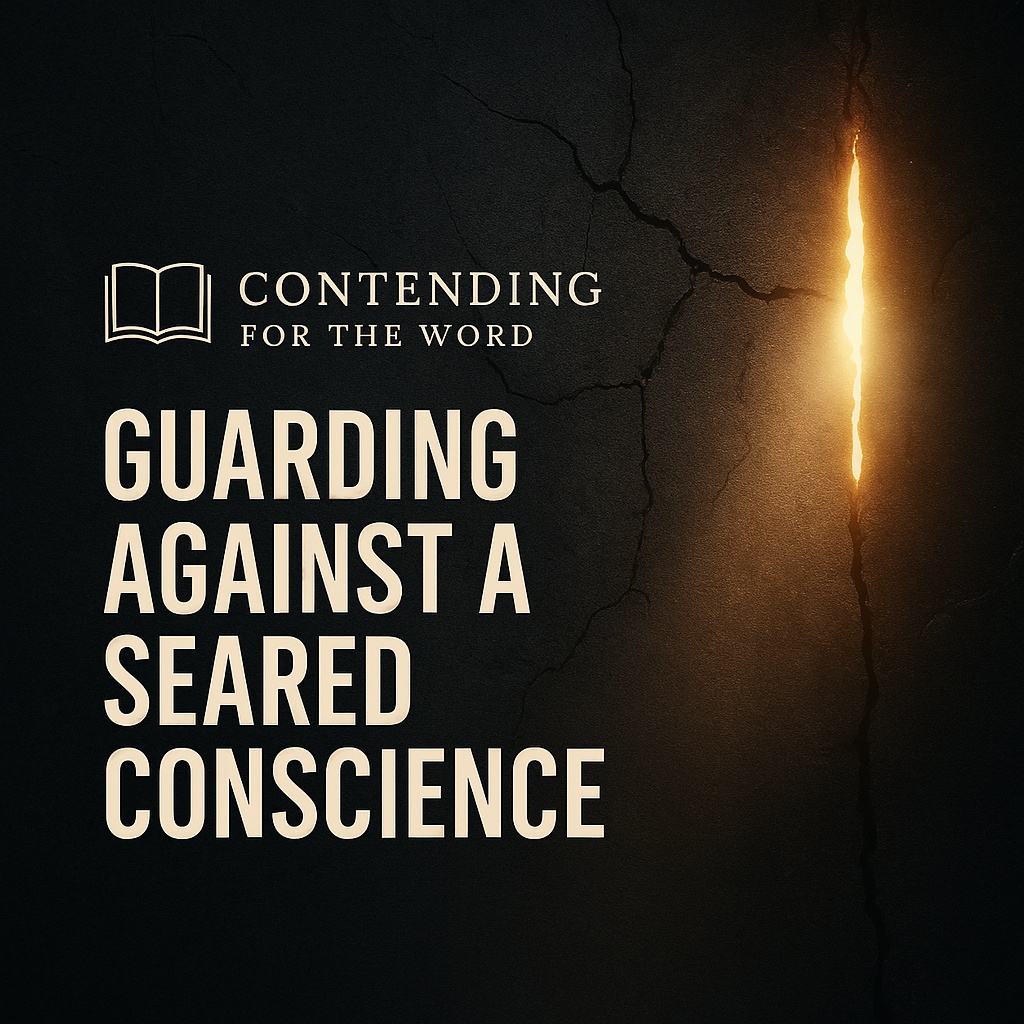⏱️ Estimated Reading Time: 3 min read
Guarding Against a Seared Conscience
Understanding the Danger of Ignoring Conviction and Hardening the Heart
What is a seared conscience? Have you ever wondered how someone can sin repeatedly—without guilt, remorse, or repentance? Scripture gives a chilling answer in 1 Timothy 4:2: they may have a seared conscience.
The Bible speaks of a conscience no longer tender to truth, no longer responsive to conviction, no longer moved by the Holy Spirit. It is not merely wounded—it is “seared,” as with a branding iron. The idea is of something cauterized and desensitized—numb to moral reality, resistant to truth, and callous toward sin.
God’s Gift of the Conscience
From the beginning, God gave every person a conscience—an internal moral witness. Paul describes it as testifying to God’s law written on the heart:
“They show that the work of the law is written on their hearts, while their conscience also bears witness…” (Romans 2:15)
Rightly formed by Scripture, the conscience serves as a guardrail, accusing or excusing our actions. But when suppressed, ignored, or bent to justify desires, it loses its God-given sensitivity. As Romans 1:18–25 warns, suppressing the truth is the first step toward exchanging God’s standards for our own.
The Slow Drift into Hardness
A seared conscience rarely happens in a moment. It develops through repeated rejection of truth and resistance to conviction. A sin that once pricked the heart becomes easy to explain away. The Spirit’s voice is drowned out by worldly reasoning. Comfort is chosen over confession; pride stiffens the heart; influences that flatter sin are welcomed.
“Exhort one another every day… that none of you may be hardened by the deceitfulness of sin.” (Hebrews 3:13)
Recognizing the Warning Signs
When the conscience hardens, the signs are subtle at first: conviction over sin fades; the Word begins to feel optional; godly counsel is brushed aside. Over time, habitual sin becomes normal. Darkness feels safe while the light of truth feels intrusive. This is why Paul warned Timothy about teachers whose consciences were already seared—they no longer blushed at deception (1 Timothy 4:2).
The Hope of Restoration
There is hope. David prayed:
“Create in me a clean heart, O God, and renew a right spirit within me.” (Psalm 51:10)
When someone humbles themselves, turns from sin, and flees to Christ, the Spirit can soften what was once calloused. Still, Scripture warns that persistent rejection of truth deepens hardness and invites judgment. The call is therefore urgent: do not ignore conviction; do not delay repentance; do not silence the Spirit’s voice.
Keep Your Heart Tender
The more we resist the truth, the less we hear it. The more we embrace sin, the less it stings. The more we sear the conscience, the harder the heart becomes.
“Today, if you hear His voice, do not harden your hearts.” (Hebrews 4:7)
A tender conscience is a gift; a seared conscience is a warning. Let this be our daily prayer: “Search me, O God, and know my heart… and lead me in the way everlasting” (Psalm 139:23–24).
Check out Contending for the Word Q&A at Servants of Grace, or our podcast at YouTube.
Dave Jenkins is happily married to his wife, Sarah. He is a writer, editor, and speaker living in beautiful Southern Oregon. Dave is a lover of Christ, His people, the Church, and sound theology. He serves as the Executive Director of Servants of Grace Ministries, the Executive Editor of Theology for Life Magazine, the Host and Producer of Equipping You in Grace Podcast, and is a contributor to and producer of Contending for the Word. He is the author of The Word Explored: The Problem of Biblical Illiteracy and What To Do About It (House to House, 2021), The Word Matters: Defending Biblical Authority Against the Spirit of the Age (G3 Press, 2022), and Contentment: The Journey of a Lifetime (Theology for Life, 2024). You can find him on Facebook, Twitter, Instagram, Youtube, or read his newsletter. Dave loves to spend time with his wife, going to movies, eating at a nice restaurant, or going out for a round of golf with a good friend. He is also a voracious reader, in particular of Reformed theology, and the Puritans. You will often find him when he’s not busy with ministry reading a pile of the latest books from a wide variety of Christian publishers. Dave received his M.A.R. and M.Div through Liberty Baptist Theological Seminary.




